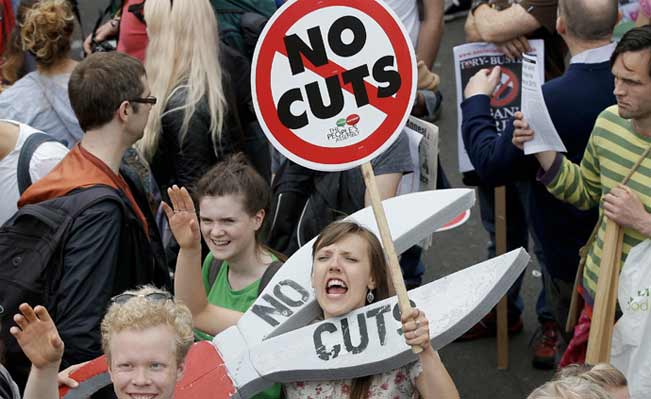
To defend labour rights and stop further brutal austerity the TUC national demonstration on 4 October is crucial, writes Bristol Counterfire’s Tom Vaughan
The Trade Union Bill – currently working its way through Parliament – is act of naked aggression from a Tory government that is dedicated to permanently dismantling labour rights. The measures set forth in the Bill – raised thresholds for strike ballots, provisions for union-busting employers to break strikes with agency workers, and restrictions on the time that union representatives can spend on union activity – constitute an all-out attack on the organising power of a working population already reeling from July’s draconian benefit cuts. The offensive continues, with plans unveiled this week to end the automatic deduction of union subscriptions from workers’ salaries.
The intent of this government is clear: clamp down on workers’ ability to organise while hacking away at the welfare budget. Play working people against each other and reduce them to ‘forelock-tugging peasants‘ in precarious temporary or zero-hours jobs, hounded by the ever-present threat of unemployment, and reliant on a diminishing state safety-net.
Thirty years after the Tories’ union-smashing spree of the 1980s, this Bill aims to snatch away from workers the last remnants of control over their employment conditions, and hand it to bosses and shareholders.
This two-pronged attack on working people is no surprise – this is the familiar logic of capitalism, the profit motive overriding human decency. However, the current conditions of post-election crisis have allowed the slash-and-burn austerity offensive to begin with a speed and ferocity that few expected.
Labour opposition has been non-existent. Punch-drunk on a (flimsy) parliamentary majority, the Tories cannot believe their luck – swaggering, cutting, and barely bothering to conceal their contempt for the working masses – but their triumphalism is premature.
This is a movement that can win – we need to show it
The TUC demonstration in Manchester on 4 October comes at a crucial moment. The labour movement and broader left are in some ways better organised now than in 2010. We have a network of People’s Assembly groups that have been organising and forging links with community groups and campaigns, local trade union branches and activists.
The 20 June anti-austerity demonstration in London was a booming statement of intent, and the momentum has continued with local actions around the country. In Bristol, we staged die-in protests against the 8 July austerity Budget, and on Saturday 9 August had information stalls and mass leafletings for Manchester at nine locations across the city.
The enthusiasm around Jeremy Corbyn’s Labour leadership bid is also hugely significant for any rejuvenated left movement. It would be naive to expect Corbyn as leader – let alone Prime Minister – to successfully advance a socialist agenda through parliamentary politics alone. However, the importance of his campaign should not be underestimated. It has served as a lightning-rod for the discontent of thousands of voters, with around 150,000 signing up as Labour supporters or members since the election.
Many people are hungry for a fightback – the campaign has prompted soaring levels of activism, particularly among the young. It is crucially important that the Manchester demonstration shows these new activists – and countless others who want to see change, but are not yet active – that this is a movement that can win.
Local mobilisation will make or break this demonstration
Corbyn recognises the importance of social movements, and the necessity of democracy beyond the ballot box. The election result will be announced on 12 September. If he wins, it is not inconceivable that the Manchester protests could gain a Labour seal of approval.
In the long run we will doubtless see Corbyn smeared, frustrated and possibly deposed by the Labour right. If he loses, there is a risk that thousands of newly energised people will be disheartened and retreat into inactivity.
Whatever the result, this is a critical juncture. The People’s Assembly and the trade unions must make the most of this strategic opportunity.
As October approaches, we must make our presence felt in our communities – promoting, agitating, engaging. We need ‘razor-sharp politics’. We must be convincing, credible, and confident that our movement is the right vehicle for change.
This autumn, we could lose our workplace rights and collective bargaining power. But if we rise to the challenge we can protect our rights and gain an even more powerful and diverse new Left, one that has the power to organise beyond elections and win the victories that we all need.

